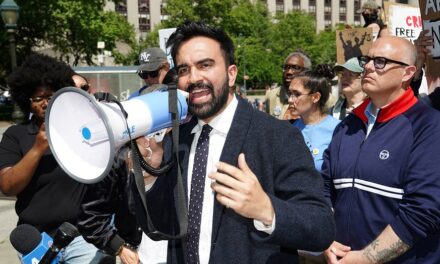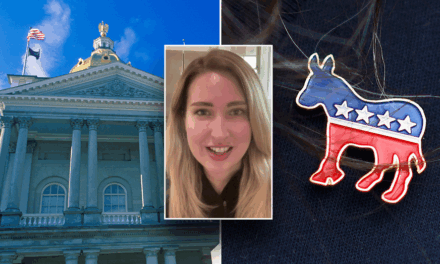In a political landscape often characterized by intense scrutiny and controversy, the recent actions of a journalist from The Atlantic magazine have sparked significant backlash from former President Donald Trump and high-ranking officials. The journalist, whose investigative work has focused on significant government issues, is now at the center of a storm following the publication of sensitive information that has ignited fierce reactions from both supporters and critics of the former president.
The piece in question revealed details surrounding sensitive discussions within the Trump administration, specifically related to national security and policy decisions that had far-reaching implications. The information, deemed classified by some agencies, has led to a heated debate over journalistic ethics, the responsibilities of news organizations, and the implications of leaking government secrets.
As the article was published, reactions were swift. Trump, known for his combative relationship with the media, took to social media to express his disapproval, labeling the reporting as “fake news” that deliberately misrepresents facts. He accused the reporter of lacking integrity and claimed that the story was a blatant attempt to undermine his presidency. This rhetoric is not unfamiliar; Trump has openly criticized various journalists throughout his career, often labeling them as untrustworthy or biased.
Top officials who were implicated in the article also voiced their concerns, emphasizing that the leaked information could jeopardize national security and undermine diplomatic relationships. They expressed frustration that sensitive discussions meant to safeguard the nation were made public. In statements issued to the press, several officials called for accountability, stating that the leak not only endangers the individuals involved but also threatens national interests.
The journalist at the center of this controversy, who has been at the forefront of covering political events through an investigative lens, defended their work. In a statement, they highlighted the importance of transparency and the role of journalism in holding power accountable. The reporter emphasized that their intention was not to jeopardize national security but rather to inform the public about significant governmental actions that could have long-lasting effects on society. They argued that, in a democratic society, the public has a right to know what decisions are being made in their name and the potential ramifications of those decisions.
The incident has sparked conversations within journalistic circles about the ethical responsibilities of reporters when handling sensitive information. Leading media organizations have come together to discuss the implications of this leak and the responsibility that journalists bear when navigating the fine line between public interest and national security. Many journalists are echoing concerns about potential chilling effects on future reporting, particularly in an era where leaks have become more frequent and the reactions from officials more aggressive.
While some in the media praised the reporter’s commitment to uncovering the truth, others expressed concern that the publication of such sensitive content could result in severe consequences, both for international relations and the safety of individuals involved. The complexities of this debate illustrate the broader challenges faced by journalists striving to report on government actions while navigating a landscape fraught with the potential for backlash from those in power.
This controversy highlights a continuing trend in the relationship between the media and political figures, particularly in the United States, where the press has often found itself at odds with governmental institutions. It raises essential questions about the balance of power, the function of the Fourth Estate, and the boundaries of ethical journalism. As allegations of “fake news” proliferate, the lines between opinion and factual reporting continue to blur in the public eye, resulting in an increasingly polarized environment.
The backlash experienced by the journalist is emblematic of a larger war on the press that many argue has been exacerbated during Trump’s presidency. The former president’s frequent attacks on the media have fostered an atmosphere in which journalists feel their work is under constant threat, leading to fears about self-censorship and the willingness of reporters to investigate controversial topics. Critics argue that such dynamics could inhibit the media’s ability to perform its critical watchdog function within a democracy.
Furthermore, the ramifications of this leak and subsequent criticism extend beyond individual journalists and the news organizations they represent. They illuminate concerns about governmental transparency and accountability. Many advocates emphasize that a free press is fundamental to a healthy democracy, providing citizens with the information necessary to make informed decisions about their leaders and policies. The ongoing debate concerning the leak suggests that the struggle for transparency in governance continues, with journalism often playing a pivotal role in shaping public discourse.
As the situation evolves, it remains to be seen how this controversy will impact the journalist’s future work and whether it will prompt more aggressive policing of sensitive information within newsrooms. The ongoing challenges faced by journalists in the current environment raise critical questions about the future of investigative reporting and the role of the press as a guardian of democracy.
This event serves as a reminder of the critical tensions that exist in reporting, particularly on government activities. The dynamic interplay between the need for public information and the necessity of protecting sensitive details will continue to provoke debate among journalists, policymakers, and the public at large. As the controversy draws attention, it serves as an important case study in the ongoing fight for the integrity and safety of press freedom in America.
In conclusion, the Atlantic journalist at the heart of this leak controversy faces not only personal backlash but also raises larger questions about the role of the press in contemporary society. As criticisms from Trump and senior officials escalate, the implications of this incident will likely reverberate throughout the media landscape. The balance of transparency, ethics, and national security continues to be a pressing topic in America, and how it unfolds will undoubtedly shape the future of journalism and the relationship between the press and the government.
































